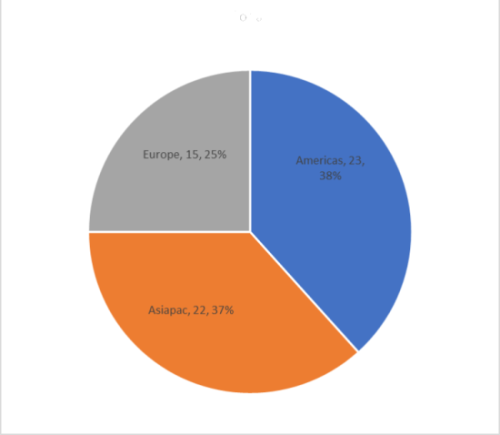The Govt renewed its list of universities which act as gateways to the High Potential Individual Visa route; graduates from approved top universities can apply to enter the UK. The list is published on the Govt web site; there’s been much comment this time round that there are no African Universities on the list but then there are no Latin American Universities nor Asian Universities apart from the pacific rim. The Govt claim to have used two other lists to construct their list; I have examined the QS index, partly because it’s easy to find and partly because I have looked at it before albeit nearly 13 years ago.
What’s startling is the number of PacRim countries now in the top 50, in 2007, there were very few, in 2021, there are many more. This should not be a surprise as the purpose of the QS index was to allow the Chinese state to plan its university programmes to support their investment led growth plans. We should also note that the QS index is/was biased towards English speaking universities.

There are no Latin American Universities in the Top 50, nor any African. The only Asian universities in this list are on the Pacific Rim, so none from the Indian subcontinent. The top Indian university is the Bombay Institute of Technology (177) and the top African university is the University of Capetown (226). The European figures (15) include 8 from the UK, and two from France, Switzerland and the Netherlands and one from Germany; the last figure surprises me, I would have thought they’d have more, but it could be as a result of the index methodology, although Switzerland has two institutes in the top 50. China has more in the top 60, than the UK and the EU. The HMG list includes the Karolinska Institute of Sweden, which I cannot find on the QS Index, but it claims 7th. The HMG List includes two US universities not in the top 60, but they claim to have sourced their list from multiple sources.
I would need to think harder about the impact of this route to entry to the country; the focus on the top 60 is clearly discriminatory as is most of the UK’s immigration law. This has even been confirmed by a leaked Home Office report. I predict someone is going to get into a lot of trouble for letting those words stay in the report!
The big and most important conclusion from examining these lists is that China is catching up, it has nine universities in the top 57, of which four are in Hong Kong. We can also note that the EU’s footprint in the top 50 is far lower than it once was as it was overly reliant on the UK’s universities.
Here’s my spreadsheet which contains my versions of the two tables, and several pivot tables and charts. …

